In this blog post, Pramit Bhattacharya, student, Damodaram Sanjivayya National Law University writes about the Constitutionality of Media Trials. The post also highlights the impact of Media Trials on the Judicial System and the society as a whole.
Media can be regarded as one of the pillars of democracy. The media plays a very crucial role in shaping the opinion of the people about an event, and it can also change the perspective of the society, giving people a different viewpoint for interpretation. In the last couple of decades, with the advent of various forms of mass communication like television and the radio, the reach and impact of media have been enhanced. The reach and growth have been further increased by the advent of the internet. Newspapers are also a very popular form of newsgathering. These modern as well as technological modes paly a very vital role in molding the opinion of the people. But it important to understand that which such powers, comes some responsibility also.[1] 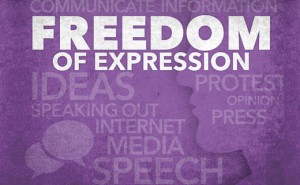
We all recognize the importance of media in a democracy. Media gets its freedom under Article 19 (1) (a) of the Constitution, which confers the freedom of speech and expression. In a highly mixed society like India, it is essential to have an independent and free media. The increasing role of media was appropriately put by Justice Learned Hand of the United Supreme Court when he said that “….the hand that rules the Press, the radio, the screen, and the far-spread magazines, rules the country.[2] Media often plays the role of a watchdog of the functionaries of the society and bring the wrongdoers into open. In many cases, the media has helped the judiciary, where due to the media highlight the Courts have taken a suo moto action.
However, there is a flip side to the role of the media also. With the increased impact and growth of media, it is very crucial that the answerability and accountability of media are there because every freedom comes with certain duties and it is also an accepted fact that even some reasonable restrictions can be placed upon the freedom for the greater good. Many a time, to grab more readers and viewers, and to increase the TRPs, media houses often concoct and distort a story and present it to the society. They often violate the right to privacy of other parties for their professional gains and to sensationalize the issue. This blatantly violates the right of fair trial of the parties which has been guaranteed under the Constitution. There have been many instances where the media has conducted their trials through their reports and have given their verdicts before the Courts could reach a decision. This is known as “Media Trial.”
Some examples of Media Trial can be the Jessica Lal murder case, Priyadarshini Mattoo Murder Case, and the Nitish Katara murder case. The recent example of it can be seen in the Ayushi Talwar murder case. Trial by media creates an impression in the mind of society on the character of the parties irrespective of the decision given by the Court. The problem is worsened when an issue involves a celebrity or a big name, where media report can have a greater impact on the sentiments of the people. Between the advantages and disadvantages of media trial, the debate about the constitutionality of media trial goes on.
Impact of Media Trial
Freedom of Speech and Expression and Media Trial
Freedom of speech and expression plays a vital role in the formation of public opinion on various matters. Therefore, it can be said that freedom of speech and expression is the supreme of all liberties, as it allows a person to place his opinion among others.[3] Keeping this in view, in the case of “Express Newspapers (Bombay) (P) Ltd. V UOI[4] the Supreme Court stated that “freedom of the press is the heart of social and political intercourse. The press has now assumed the role of the public educator making formal and non-formal education possible on a large scale particularly in the developing world, where television and other kinds of modern communication are not still available for all sections of society. The purpose of the press is to advance the public interest by publishing facts and opinions without which a democratic electorate [Government] cannot make responsible judgments. Newspapers being purveyors of news and views having a bearing on public administration very often carry material which would not be palatable to Governments and other authorities.” This statement clearly points out to the fact that freedom of press and media is of utmost importance for the proper functioning of the democratic setup.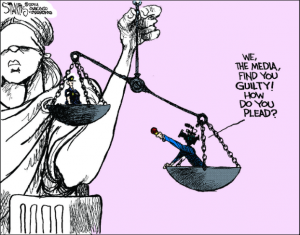
In Printers (Mysore) Ltd. V CTO[5], the Apex Court stated that freedom of the Press is not a fundamental right which has been expressly guaranteed, but interpretation the Constitution implies that it is essential to give freedom of expression to the Press. In the judicial pronouncement of R Rajagopalan v. the State of TN,[6] the Court stated that this right extends to cases where public figures, public events, and issues are involved but a balance should be maintained between public events and private lives of people
Therefore, it is clear that the freedom of speech and expression gave to the Press is conferred by Article 19 (1) (a) of the Constitution, and since the Press does not stand any different from the other citizens of the country, no special restriction can be placed upon it.
Media Trial and Fair Trial
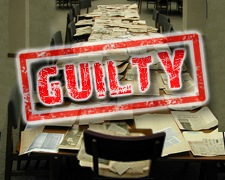 Media Trial can sometimes become a problem because it gives rise to two conflicting ideologies- a fair trial and freedom of Press. Both the concepts has an effect on the public lives. Freedom of public in the democracy gives the right to the freedom of Press. This is used as a justification for campaign and investigative journalism. On the other hand, a trial which is not affected by external factors, i.e., free and fair trial is a basic principle of the judicial system. A media trial may be prejudicial to the case of the parties, or it may influence the opinion of the court because to be very honest, no person is impartial and unbiased. It is human nature to be biased towards a certain view, and even a Court can fall into this trap. In many cases, the media exceeds its freedom of speech and expression by broadcasting and publishing materials which are prejudicial to the interest of the parties like the character of the parties, photographs, criticism of the witnesses, etc.
Media Trial can sometimes become a problem because it gives rise to two conflicting ideologies- a fair trial and freedom of Press. Both the concepts has an effect on the public lives. Freedom of public in the democracy gives the right to the freedom of Press. This is used as a justification for campaign and investigative journalism. On the other hand, a trial which is not affected by external factors, i.e., free and fair trial is a basic principle of the judicial system. A media trial may be prejudicial to the case of the parties, or it may influence the opinion of the court because to be very honest, no person is impartial and unbiased. It is human nature to be biased towards a certain view, and even a Court can fall into this trap. In many cases, the media exceeds its freedom of speech and expression by broadcasting and publishing materials which are prejudicial to the interest of the parties like the character of the parties, photographs, criticism of the witnesses, etc.
Article 14, 20, 21 and 22 gives various rights to a person through which he can exercise his right to free, and fair trial and the media cannot go beyond their rights to assert their rights. Needless to say, the right of having a fair trial is more important as it flows directly from Article 21 when read with Article 14. In a way, the right of having a fair trial is above freedom of speech and expression given to the Press under Article 19.
Media Trial and Right to be Represented
Sometimes, media trials create a lot of pressure on the lawyers, not to take the case of a party, which forces the accused party to go through the trials without having any defense. Take the case of Mohd. Kasab for instance. Yes, it was very evident that he was the guilty party. But did not he also deserve a fair trial? The media created a scenario where any lawyer who would have taken up his case seem like an anti-national. Isn’t this against the fundamental principles of natural justice? Every person is entitled to get the lawyer of his choice and defend himself in the court of law, and nobody can bar it from doing so. Another instance is when Ram Jethmalani decided to defend Manu Sharma. The criticism he faced from the media was immense, and it was stated that he was trying to defend the indefensible. Sometimes the media also presents a case in such a manner that if a judgment is given to contrary to that of the media trial, the judge who has given the verdict is made to look like as biased and corrupt.
Constitutionality of Media Trials
Freedom of Press
Article 19 of the International Covenant on Civil and Political rights, 1966 states that every person has the right to freedom of speech. However this right is subject to some duties and responsibilities and is subject to right and reputation of other individuals. In the judicial pronouncement of In Re: Harijan Singh and Anr and In Re: Vijay Kumar[7] The Supreme Court recognized media as an essential advantage in the democratic setup. Right to information and the right to broadcast is also conferred by Article 19 of our Constitution.
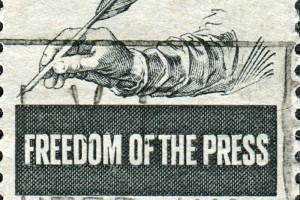 In the case of Hamdard Dawakhana v UOI,[8] It was opined by the Court that right also includes the right to gain information and knowledge about matters that are of common interest. But the Supreme Court has also stated that a trial by media is opposite of the rule of law. But as the media is one of the foremost pillars of the democracy, their freedom can’t be curtailed, but can be restricted to a certain point.Balance should be maintained between the freedom of Press and the rule of law.
In the case of Hamdard Dawakhana v UOI,[8] It was opined by the Court that right also includes the right to gain information and knowledge about matters that are of common interest. But the Supreme Court has also stated that a trial by media is opposite of the rule of law. But as the media is one of the foremost pillars of the democracy, their freedom can’t be curtailed, but can be restricted to a certain point.Balance should be maintained between the freedom of Press and the rule of law.
Immunity under Contempt of Court Act, 1971
Under this Act, pre-trial publications are given immunity against contempt proceedings, certain acts like the publication of any material by the media by the pre-trial stage can affect the interest of the parties involved in the trial. For example, in the case of Ayushi Talwar murder case, the media came up with a lot of reports like the character of the parties, the strength of the evidence etc. which proved prejudicial to the case of the parties. Despite this, these publications have been granted immunity. These publications may harm the justice system if they are not restricted to a certain level and if they are allowed to go unchecked.
Public’s Right to Know
The Supreme Court has stated that the main principle in giving the freedom to the Press it enjoys is that the public has the right to know what is happening in the society. The Apex Court elaborated on the principle and opined that the main function of the Press is to provide all-encompassing and objective information to the society which relates to country’s social, economic, political and cultural life. The media has an educative role to play while dispensing this function.[9] The Court also stated that the public has the right to know the “correct news” and the media shouldn’t make up stories to sensationalize matters.
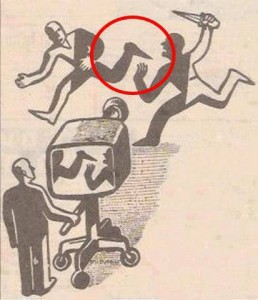
Highlighting the merits of the media in the Bofors Case,[10] The Supreme Court was of the view that those who know anything about the matter might come forward with information, it reduces crime through society’s disapproval of certain acts, and most importantly it leads to a public discussion of important issues.
Public Participation
Trial by media is often justified by giving the argument that the media highlights what is already there in the minds of the people. Media is also supported through the argument that in a democracy, having a transparent and accountable setup is of utmost importance. Without a free press, the society will go back to the time when proceedings were conducted in secret without the knowledge of the public. The media through its campaign journalism provides a platform to the public to express its opinion and hence ensure their participation.
Legal Norms and Journalistic Conduct
The Press Council is instituted under The Press Council Act, 1978. The main objective of the Council is to ensure the freedom of Press.[11] The Council also holds the authority to sanction punishment for irresponsible journalism.
Concluding Remarks
Trial by media can be regarded as a necessary evil. Many big scams were uncovered by the media, and the law merely followed them up. The media houses must be given credit where it is due for extracting information that was so well guarded. One of the other advantages of having a strong and free press is that people are now aware of their rights owing to the fact that they are being exposed to a lot of information. But the fact remains that media has to be a regulated in some way or the other. They cannot remain unchecked and do a trial which gains more publicity. The Supreme Court has also stated that it is acceptable that the media should be independent and free, but they can’t come in the way of Justice and exercise their freedom in such a way that it is prejudicial to the proceedings itself. The problem does not lie in media’s exposing the wrongs in the society. The problem arises when they go beyond the rights conferred to them and do things which they shouldn’t. The credibility of news media rests on unbiased, objective reporting. It is in the media’s interest to ensure that the administration of justice is not undermined.
[divider]
Footnotes:
[1]http://www.civilservicestimes.co.in/editorial-/current-national-issues/416-trial-by-media-looking-beyond-the-pale-of-legality-.html
[2]http://www.forbes.com/quotes/5916/
[3]Freedom of press in India: Constitutional Perspectiveshttp://www.supremecourtcases.com/index2.php?option=com_content&itemid=1&do_pdf=1&id=6752
[4](1985) 1 SCC 641 at p. 664, para 32.
[5](1994) 2 SCC 434
[6] (1994) 6 SCC 632
[7](1996) 6 SCC 466, paras 8, 9 and 10.
[8]1960 (2) SCR 671
[9]In Re: Harijan Singh and Anr.; In Re: Vijay Kumar, (1996) 6 SCC 466, para 10.
[10]KartongenKemiOchForvaltning AB v. State through CBI, 2004 (72) DRJ 693.
[11]Press Council Act, 1978, Section 13(1).
 Serato DJ Crack 2025Serato DJ PRO Crack
Serato DJ Crack 2025Serato DJ PRO Crack










 Allow notifications
Allow notifications


